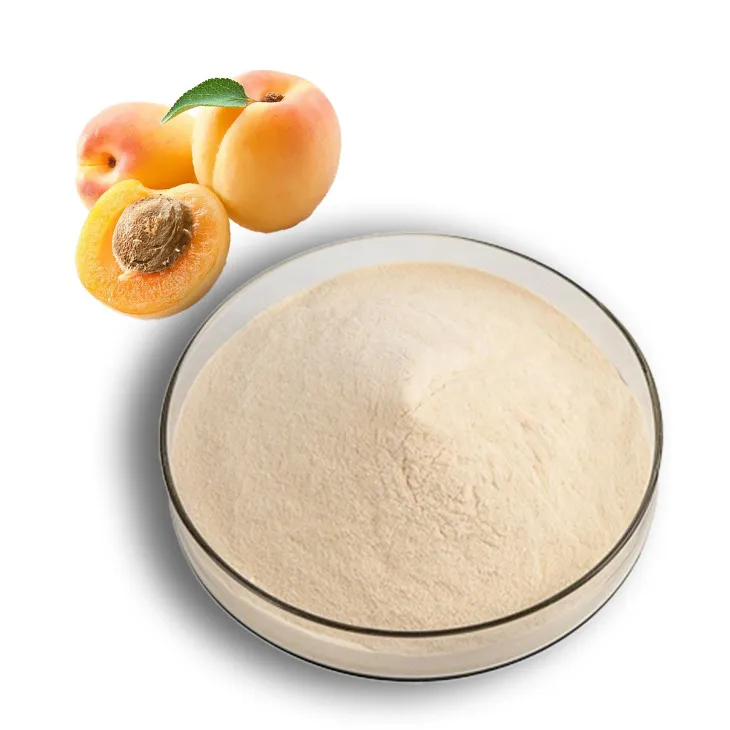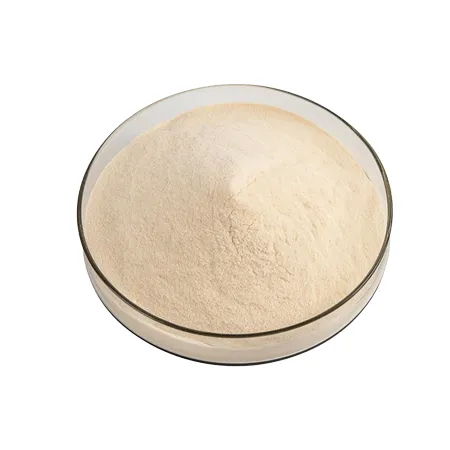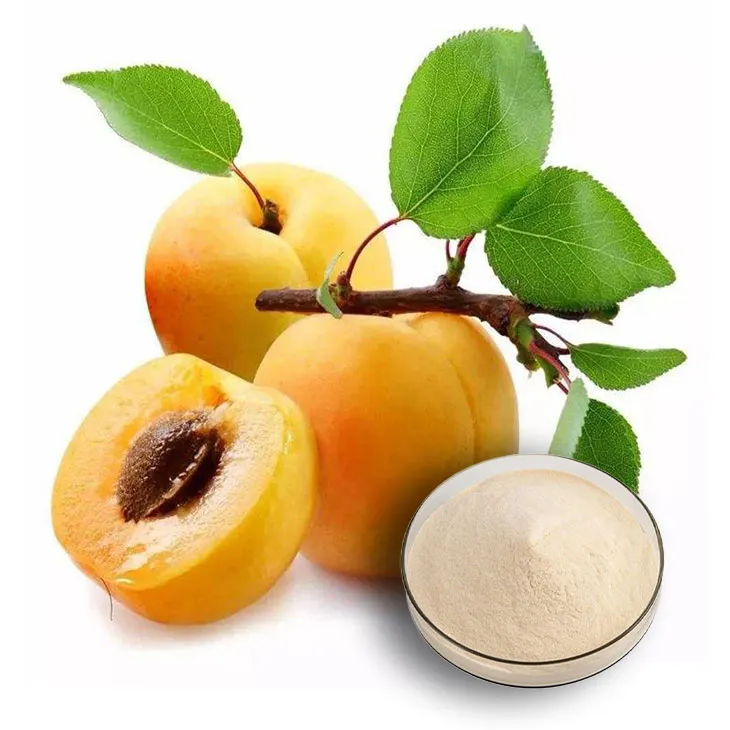- 0086-571-85302990
- sales@greenskybio.com
How do top apricot powder manufacturers take advantage of new projects?
2024-12-16

Introduction
In the highly competitive Apricot Powder manufacturing industry, top - tier manufacturers are constantly seeking ways to gain an edge. New projects present a plethora of opportunities for these manufacturers to enhance their market position, improve product quality, engage customers more effectively, and achieve greater cost - effectiveness. This article will explore how these manufacturers can capitalize on new projects from different perspectives and identify the key factors for success.

Quality Improvement
1. Research and Development in New Projects
- Top Apricot Powder manufacturers can invest in new projects focused on research and development (R&D). This may involve exploring new apricot varieties that are more suitable for powder production. For example, some new apricot varieties might have a higher nutrient content or a better flavor profile. By conducting thorough research on these varieties, manufacturers can select the most optimal ones for their production process.
- New projects in R&D can also target improving the extraction and processing methods. Advanced extraction techniques can ensure that more of the beneficial components in apricots, such as vitamins, minerals, and antioxidants, are retained in the powder. For instance, using supercritical fluid extraction can be a new project area. This method can operate at lower temperatures compared to traditional extraction methods, reducing the degradation of heat - sensitive components.
- New projects can be centered around enhancing quality control measures. Implementing a more comprehensive and strict quality control system can ensure that the Apricot Powder meets the highest standards. For example, manufacturers can invest in new testing equipment for detecting contaminants, such as pesticides or heavy metals, at lower detection limits.
- Another aspect of quality control in new projects could be the standardization of the production process. By defining precise process parameters and closely monitoring them during new projects, manufacturers can reduce variability in product quality. This includes factors such as temperature, humidity, and processing time during drying and milling processes.

Customer Engagement
1. New Product Development for Specific Customer Needs
- Manufacturers can initiate new projects to develop apricot powder products tailored to specific customer needs. For example, there could be a new project to create a low - sugar apricot powder for diabetic customers. This would require research into alternative sweeteners and formulation adjustments to maintain the taste and texture while reducing sugar content.
- Another new project could be aimed at developing apricot powder products for the fitness market. This might involve adding additional protein sources or creating convenient single - serve packets for on - the - go consumption. By addressing the specific needs of different customer segments, manufacturers can attract new customers and enhance loyalty among existing ones.
- New projects in marketing can have a significant impact on customer engagement. For instance, a manufacturer could launch a new project to create an immersive brand experience. This could involve setting up interactive booths at food fairs or creating virtual reality (VR) experiences that showcase the journey of apricot powder from the orchard to the consumer's table.
- Social media - based new projects are also crucial. Manufacturers can start new campaigns on platforms like Instagram or TikTok, where they can share interesting facts about apricots, recipes using apricot powder, and behind - the - scenes looks at the manufacturing process. This type of content can attract a large following and encourage customers to engage with the brand on a more personal level.

Cost - Effectiveness
1. Supply Chain Optimization in New Projects
- New projects can focus on optimizing the supply chain. For example, a manufacturer could initiate a project to establish direct relationships with apricot farmers. By cutting out middlemen, they can reduce procurement costs. This new project might also involve implementing a just - in - time inventory system, which can minimize storage costs while ensuring a continuous supply of fresh apricots for production.
- Another aspect of supply chain optimization in new projects could be the exploration of new transportation methods. For instance, using refrigerated containers for transporting apricots can reduce spoilage during transit, thereby reducing overall costs associated with waste.
- Manufacturers can undertake new projects to improve process efficiency. This could include upgrading machinery to more energy - efficient models. For example, replacing old - fashioned dryers with new - generation ones that consume less energy can lead to significant cost savings in the long run. New projects could also target process automation, reducing the need for manual labor and increasing production speed while maintaining quality.
- Waste reduction is another area for new projects. By analyzing the production process, manufacturers can identify areas where waste is generated and develop new projects to minimize it. For instance, they can find ways to utilize apricot by - products more effectively, such as using apricot pits for other value - added products or converting waste into bio - energy.
Key Factors for Success
1. Market Research
- Thorough market research is essential for the success of new projects. Manufacturers need to understand the current market trends, customer preferences, and competitor activities. For example, they need to know if there is a growing demand for organic apricot powder or if customers are more interested in convenience - packaged products. This information can guide the direction of new projects and ensure that they are in line with market needs.
- Collaborating with other entities can be a key factor in the success of new projects. This could include partnerships with research institutions for R&D purposes. For instance, working with a university's food science department can provide access to state - of - the - art research facilities and expertise. Manufacturers can also collaborate with suppliers and distributors to ensure the smooth implementation of new projects related to supply chain optimization.
- Innovation is crucial for new projects. Manufacturers need to be open to new ideas and technologies. For example, being the first to adopt a new drying technology or a novel packaging concept can give them a competitive advantage. At the same time, they need to be adaptable to changes in the market and regulatory environment. If new regulations regarding food safety or labeling are introduced, manufacturers must be able to quickly adjust their new projects accordingly.
- Proper financial management is vital for new projects. Manufacturers need to accurately estimate the costs involved in a new project, including R&D, equipment purchase, marketing, etc. They also need to secure appropriate funding sources, whether it is through internal investment, bank loans, or venture capital. Additionally, they need to monitor the financial performance of new projects closely to ensure that they are on track to achieve the expected returns.
Conclusion
In conclusion, new projects offer top apricot powder manufacturers numerous opportunities to improve quality, engage customers, and achieve cost - effectiveness. By focusing on areas such as quality improvement, customer engagement, and cost - effectiveness, and by considering the key factors for success such as market research, collaboration, innovation, and financial management, manufacturers can make the most of these new projects and strengthen their position in the highly competitive apricot powder market.
FAQ:
Question 1: How can top apricot powder manufacturers ensure quality improvement in new projects?
Top apricot powder manufacturers can ensure quality improvement in new projects in several ways. Firstly, they can invest in advanced production technologies and equipment. This allows for more precise processing of apricots, ensuring consistent quality in terms of powder fineness, purity, and nutrient retention. Secondly, strict quality control measures should be implemented throughout the production process. Regular inspections of raw materials, during - production sampling, and final product testing can help identify and eliminate any potential quality issues. Thirdly, partnering with reliable apricot suppliers is crucial. High - quality raw materials are the foundation of good - quality apricot powder. By sourcing apricots from trusted farmers or suppliers, manufacturers can better control the quality of the end product.
Question 2: What are the effective ways for apricot powder manufacturers to enhance customer engagement in new projects?
To enhance customer engagement in new projects, apricot powder manufacturers can start by conducting market research to understand customer needs and preferences. Based on this, they can develop new product features or flavors that appeal to a wider range of customers. For example, creating apricot powder blends for specific uses such as in baking or smoothies. Social media platforms can be a powerful tool for engagement. Manufacturers can create engaging content such as recipe videos, health - related tips using apricot powder, and behind - the - scenes looks at the production process. This not only educates customers but also builds a connection with them. Offering samples and running promotional campaigns can also attract new customers and keep existing ones interested. Additionally, establishing a customer feedback mechanism, such as surveys or online forums, allows manufacturers to listen to customer opinions and improve their products and services accordingly.
Question 3: How can cost - effectiveness be achieved by top apricot powder manufacturers in new projects?
Top apricot powder manufacturers can achieve cost - effectiveness in new projects through various means. Economies of scale can be a major factor. By increasing production volume in new projects, they can reduce the per - unit cost of production. This could involve investing in larger - scale production facilities or optimizing production processes to increase efficiency. Another way is to source apricots more cost - effectively. This could mean negotiating better prices with suppliers, exploring new sourcing regions with lower costs, or even considering vertical integration by growing their own apricot orchards. Energy - efficient production equipment can also contribute to cost - savings in the long run. Additionally, reducing waste during production through better inventory management and process control can help cut costs.
Question 4: What are the key factors for success in new projects for apricot powder manufacturers?
The key factors for success in new projects for apricot powder manufacturers include quality control, as mentioned before. High - quality products are more likely to gain customer trust and loyalty. Innovation is also crucial. This could be in the form of new product formulations, packaging designs, or production methods. A strong marketing strategy is necessary to create brand awareness and promote the new products. Understanding the competitive landscape and differentiating their products from competitors is essential. Having a skilled and experienced team is another factor. From production workers to R & D and marketing professionals, a competent team can drive the success of the new project. Additionally, regulatory compliance is vital. Adhering to food safety and quality regulations ensures that the products can be sold without legal issues.
Question 5: How can new projects help apricot powder manufacturers expand their market share?
New projects can help apricot powder manufacturers expand their market share in multiple ways. New product launches through new projects can attract new customer segments. For example, if a manufacturer develops a low - sugar apricot powder, it may appeal to health - conscious consumers who were previously not interested in traditional apricot powder. Entering new geographical markets is also possible with new projects. This could involve setting up production facilities in new regions or tailoring products to meet the tastes and regulations of different countries. Collaborations and partnerships in new projects can also open up new distribution channels or customer bases. For instance, partnering with a large food retailer for an exclusive product line can increase market penetration. Additionally, new projects that focus on sustainability or unique selling propositions can enhance the brand's image, making it more competitive in the market and thus helping to gain a larger market share.
Related literature
- The Role of Innovation in the Food Manufacturing Industry"
- "Quality Control in Powder - Based Food Production"
- "Cost - Effectiveness Strategies for Agricultural Product Manufacturers"
- "Customer Engagement in the Food and Beverage Sector"
- ▶ Hesperidin
- ▶ citrus bioflavonoids
- ▶ plant extract
- ▶ lycopene
- ▶ Diosmin
- ▶ Grape seed extract
- ▶ Sea buckthorn Juice Powder
- ▶ Beetroot powder
- ▶ Hops Extract
- ▶ Artichoke Extract
- ▶ Reishi mushroom extract
- ▶ Astaxanthin
- ▶ Green Tea Extract
- ▶ Curcumin Extract
- ▶ Horse Chestnut Extract
- ▶ Other Problems
- ▶ Boswellia Serrata Extract
- ▶ Resveratrol Extract
- ▶ Marigold Extract
- ▶ Grape Leaf Extract
- ▶ blog3
- ▶ blog4
- ▶ blog5
-
All about L - Citrulline - DL - Malic Acid.
2024-12-16
-
Genistein
2024-12-16
-
Hops Extract
2024-12-16
-
Nettle Root Extract
2024-12-16
-
Hesperidin
2024-12-16
-
Alfalfa Meal
2024-12-16
-
Plantain extract
2024-12-16
-
Cranberry Extract
2024-12-16
-
Lily extract
2024-12-16
-
Boswellia Serrata Extract
2024-12-16
-
Resveratrol extract
2024-12-16





















